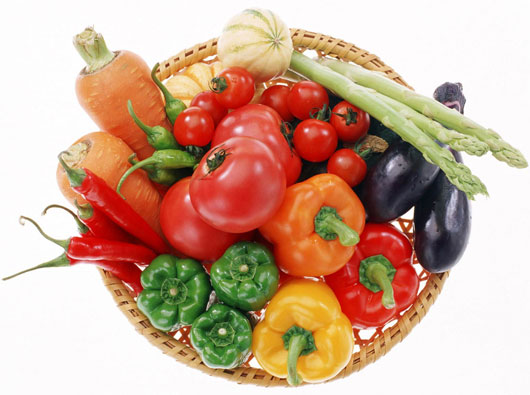Things to know about fresh vegetables
Fruits and vegetables not only contain a lot of fiber and vitamins that are good for the digestive system, but also precious medicines that help people resist many diseases. Let's learn about the benefits and needs of vegetables and fruits in everyday life!
1. Identify the benefits of vegetables in color
Every color of fresh vegetables and fruits represents a type of Phytonutrient - natural nutrients that are concentrated in the skin to create colors, scents and flavors for fruits and vegetables, which are very beneficial for our health. .
Green: from green cabbage, lettuce, kale, green tea, . contains a lot of lutein and zeaxanthin, helps protect eyesight and reduces the risk of cataracts, one of the causes of blindness blind.
Red: from tomato, red onion, beetroot, sugar beet, . contains Lycopene compound to help reduce the risk of cardiovascular disease.

Orange: from carrots, orange sweet potatoes, pumpkins, . banks containing beta-carotene. They stimulate the active antibody system, maintain the skin, make bones strong and good vision.
White: from onion, garlic, white radish . contains Allicin, which helps to stop the proliferation and proliferation of cancer cells.
Yellow: from yellow bell peppers, lemon, yellow sweet potatoes, . contains a lot of vitamin C, support antibodies.
Purple : from red onion, eggplant, purple cabbage, . capable of both fighting cancer and reducing the aging process, maintaining youth.
2. Nutritional needs of fruits and vegetables every day
As recommended by the National Institute of Nutrition, an adult needs 25-30g of fiber a day, equivalent to about 300g of vegetables and 200g of fruit. So every main meal, you have to eat 100g of vegetables - ie 1 cup full of (without water) vegetables or gourd, squash, cucumber, tomatoes . With fruits also have to eat the whole shell, both citrus, even fruit new fiber, not just juice.
Besides, for young children, practice to eat one to one year of age and gradually increase from 1 teaspoon of vegetable / meal to 2 tablespoons / meal; children 1-2 years old: 30g of vegetables / meal; Children> 2 - 5 years old: 50g vegetables / meal. For overweight and obese children, it is necessary to increase the amount of vegetables and fruits every day. Eat plenty of boiled vegetables, cook soup, salad, salad, eat at the beginning of the meal to create a feeling of fullness.
3. Prioritize foods from fresh vegetables

Most people today cannot get enough of these fruits and vegetables and the meals are not fully guaranteed with vegetables. The reason is due to worries about poor fresh fruits or vegetables.
In this case, the housewife can use food prepared from fresh vegetables to provide safe vegetables and enough micronutrients for the whole family. As a complete spice sauce Barona with a complete extract from a wide range of fresh, natural, easy-to-absorb vegetables and fruits that will help housewives ensure safety for simple meals. Turn the kitchen story on and still ensure the deliciousness and taste of the whole family.
- The scientific way of 'increasing life expectancy' for fresh fruits and vegetables
- Fresh vegetables: How to use it for safety?
- Technology keeps the flavor of frozen vegetables
- Tips to keep fresh fruits after peeling and tending
- Are vegetables in the supermarket really fresh as you think?
- Toshiba tested fresh vegetables without washing them before eating
- Growing vegetables in the room
- Fresh vegetables help restore lung damage in people who have quit smoking
- How to keep fresh vegetables without preservatives
- 10 types of vegetables that contribute to incurable treatment only
- Techniques of growing clean vegetables in simple foam pots at home
- Growing vegetables almost doesn't use soil and water
 Soaking vegetables in salt water does not remove chemicals but you should still do it
Soaking vegetables in salt water does not remove chemicals but you should still do it You should limit bamboo shoots if you have 1 in 5 of these diseases
You should limit bamboo shoots if you have 1 in 5 of these diseases Mistakes when soaking vegetables in salt water
Mistakes when soaking vegetables in salt water Risk of death when combining shrimp with vitamin C
Risk of death when combining shrimp with vitamin C